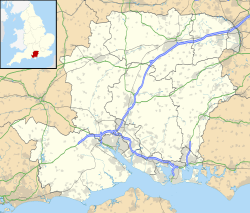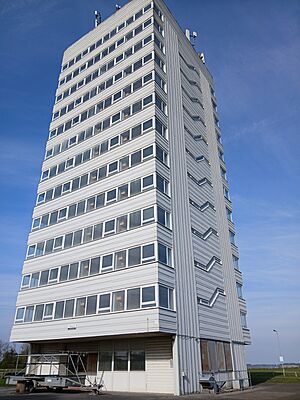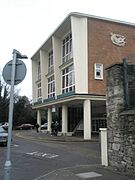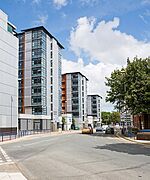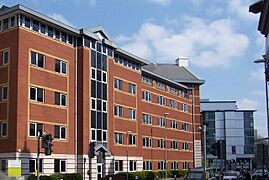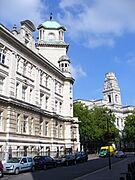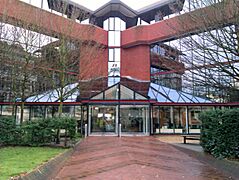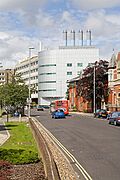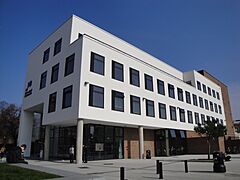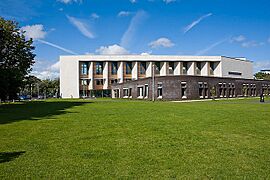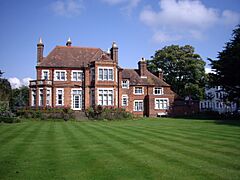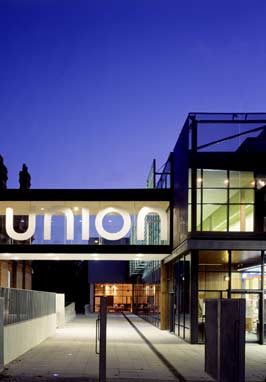University of Portsmouth facts for kids
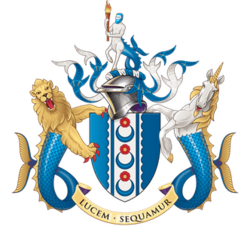
Coat of arms of the University of Portsmouth
|
|
|
Other name
|
UoP |
|---|---|
|
Former names
|
See History |
| Motto | Latin: Lucem Sequamur |
|
Motto in English
|
Let us follow the Light |
| Type | Public |
| Established | c. 1870 (as Portsmouth and Gosport School of Science and Art) |
| Budget | £290.5 million (2021/22) |
| Chancellor | Karen Blackett |
| Vice-Chancellor | Graham Galbraith |
|
Total staff
|
3,500 |
| Students | 29,000 (2021/2022) |
| Undergraduates | 22,170 (2020/21) |
| Postgraduates | 6,110 (2020/21) |
| Location |
,
Hampshire, United Kingdom
50°47′43″N 01°05′36″W / 50.79528°N 1.09333°W |
| Campus | College town with multiple sites including: University Quarter Northern Quarter Langstone Campus London Campus |
| Colours | Purple Black White |
| Affiliations | Universities UK |
 |
|
The University of Portsmouth (also called UoP) is a public university in England. It has campuses in Portsmouth and Walthamstow. The university started a long time ago, in 1870. It was first known as the Portsmouth and Gosport School of Science and Art.
Over the years, it changed names several times. It became Portsmouth Polytechnic in 1969. Then, in 1992, it officially became a university. Today, the university has five main departments. It offers many different subjects to study. These include business, law, arts, sciences, and technology. In the 2021/22 school year, over 28,000 students attended. About 3,500 teachers and staff work there.
The university is known for its research. This includes studies in space, crime, computer security, and the environment. In 2021, much of its research was rated as excellent. Portsmouth is often seen as one of the best modern universities in the UK. It is praised for its teaching and how happy its students are. Many graduates also find jobs easily. In 2023, it received the highest rating, Gold, for its teaching quality. The university helps the local area grow. It works with the government and businesses. Its location by the sea means it has strong ties to the navy.
The university is managed by a group called the Board of Governors. They make big decisions about the university's future. The Vice-Chancellor runs the university day-to-day. This person is supported by a team of leaders. Academic standards are looked after by the Academic Council. The university's leader for ceremonies is the Chancellor. Currently, this is Karen Blackett, a well-known businesswoman.
Contents
University History
Early Beginnings in the 1800s
The University of Portsmouth began on June 1, 1870. It was first called the Portsmouth and Gosport School of Science and Art. In the late 1800s, the school was in different buildings. These were in Old Portsmouth and Southsea. The main building was on Pembroke Street. Both boys and girls went to school there.
Because Portsmouth is a port city, the school taught technical skills. These skills were for engineers and skilled workers. Many students went on to work at the city's docks. This included working for the Royal Navy. Students learned things like geometry, artistic anatomy, and drawing. The school also had evening classes for local craftspeople.
New Schools for Art and Technology
In 1894, education rules changed. Local councils gained control over technical education. The Borough of Portsmouth then started the Portsmouth Municipal Technical Institute. This new institute took over the science and technology courses. The original school became the College of Art.
Growing in the 1900s
Portsmouth Municipal College and the Park Building
In 1903, a new law about education was passed. Building started on a new site behind the Portsmouth Guildhall. The building was designed by G.E. Smith. It was finished in 1908. The building has a mix of old European architectural styles. In the same year, the Portsmouth Municipal Technical Institute became the Portsmouth Municipal College.
This college offered many courses. These included chemistry and engineering. The College of Art and a public library also shared the building. Today, this building is still used by the university. It is now called the Park Building. It was named after Victoria Park, a nearby park.
In 1911, student groups were formed for both male and female students. A student magazine called The Galleon started that autumn. It reported on a new women's basketball team. It also talked about problems with the student common room.
After World War II, there was less need for engineering skills in Britain. So, the college started teaching more subjects. These included arts and humanities.
Portsmouth College of Technology
In 1953, the Portsmouth Municipal College changed its name. It became the Portsmouth College of Technology. It was then the main college for Southern England.
Becoming a Polytechnic
The college was renamed Portsmouth Polytechnic in 1969. It became one of the largest polytechnics in the UK by the late 1980s.
Becoming a University
On July 7, 1992, the University of Portsmouth officially opened. A ceremony was held at Portsmouth Guildhall. As a new university, it could now create its own degrees. This was allowed by a new education law.
The 2000s and Beyond
On May 4, 2018, the University of Portsmouth became the main sponsor for the Portsmouth F.C. football team. This sponsorship lasted for three seasons.
University Campuses
The university has two main areas. One is the University Quarter, near the Portsmouth Guildhall. The other is the Langstone Campus.
Langstone Campus
Langstone is the smaller campus. It is located in Milton, on the eastern side of Portsea Island. The campus looks out over Langstone Harbour. It is also home to the university's sports fields.
The School of Languages used to be at Langstone Campus. It has since moved to the Park Building. Langstone Campus also used to have three student dorms. These housed 565 students. However, these dorms were closed and taken down. This was done to have more student housing closer to the main university buildings.
In 2024, parts of the Langstone campus reopened. Two dorms there now house about 250 students.
University Quarter
The University Quarter has many university buildings. They are located around the city center. Most of the teaching facilities are here. Nearly all student dorms are also in this area. The only exceptions are the Langstone student village and two dorms on Southsea Terrace.
The University Library was made bigger in 2006. This cost £11 million. The crime writer P. D. James opened it. The university has also improved its science buildings. For example, the main St Michael's building was renovated.
Partnership with Oman
In 2013, the University of Portsmouth announced a partnership. It teamed up with the Military Technological College of Oman. The university helps guide their academic programs. It also gives official recognition for the education of 4,200 students. These students learn technical skills for military and some civilian jobs in Oman.
London Campus
On September 15, 2023, the University of Portsmouth opened a new campus. This campus is in Walthamstow, London. The London campus teaches in a special way. Students focus on one subject at a time. Assignments are part of the teaching. This new campus aims to help the local economy. It is expected to create many new jobs.
How the University Works
Leadership and Management
The university's ceremonial leader is Karen Blackett. She became the Chancellor in 2017. The university is run daily by the Vice-Chancellor. This is currently Professor Graham Galbraith. He works with a team of leaders. This team includes deputy vice-chancellors and other important directors.
The university's Board of Governors is in charge of everything. They are responsible for all the university's activities.
University Departments (Faculties)
The University of Portsmouth has five main departments. These are called faculties. Each faculty has several schools, institutes, or departments.
|
Faculty of Business and Law
|
Faculty of Creative and Cultural Industries
|
Faculty of Humanities and Social Sciences
|
Faculty of Science and Health
|
Faculty of Technology
|
Money Matters
In 2017, a study found that the University of Portsmouth helps the British economy a lot. It is worth £1.1 billion to the country. It also brings £476 million to the city of Portsmouth.
What Students Study
Portsmouth offers many different degrees. There are over 200 undergraduate degrees. These are for students starting college. There are also 150 postgraduate degrees. These are for students who want to study more after their first degree. Plus, there are 65 research programs.
Research at the University
Over 60% of the university's research was rated as world-leading or excellent in 2014. This means their studies are very important globally. For example, 90% of their research in health and pharmacy was top-rated. Also, 89% of their physics research was highly praised.
In 2017, a big research project started. It is called CRUNCH. This project looks at how cities can be ready for climate change. It studies how food, water, and energy are connected. The University of Portsmouth leads this project. It works with universities in other countries.
University Rankings
| National rankings | |
|---|---|
| Complete (2021) | 42 |
| Guardian (2021) | 41 |
| Times / Sunday Times (2021) | 55 |
| Global rankings | |
| ARWU (2020) | 901–1000 |
| QS (2021) |
635= |
| THE (2021) | 401–500 |
| British Government assessment | |
| Teaching Excellence Framework | Gold |
The University of Portsmouth is ranked among the top universities in the world. For 2025, it was in the top 401–500 universities by Times Higher Education. QS World University Rankings placed it at #635 for 2026. Other rankings also place it well globally.
In 2017, Portsmouth was one of only four universities in the South East of England to get the highest Gold rating for its teaching quality. This rating comes from the Teaching Excellence Framework (TEF).
Student Life
The University of Portsmouth Students' Union (UPSU) is a group that helps students. All students at the university automatically become members. The Students' Union offers support and chances to learn new skills. They also speak for students at the university and in the community.
The Students' Union has been around since at least 1911. It used to be in different buildings. Since 2002, it has been located at the north end of Ravelin Park. The Union used to have two nightclubs, Lux and Co2. These were closed in 2009 and changed for other uses.
The Union Advice Service gives private and fair help to students. They offer information and advice on many school and life topics. This service also holds events to help students stay healthy and happy. The Advice Service is in Gun House at The Union. In 2016, Portsmouth was named the most affordable city for students in the UK.
Clubs and Sports
The Students' Union supports over 150 student-run groups. These groups offer many activities outside of classes. They include sports clubs, societies, and media groups. Students can also start new groups with the Union's help.
The Union has many sports clubs. These are managed by the Athletic Union. Sports include team games like football, cricket, rugby union, and netball. There are also unique sports like octopush (underwater hockey). As of October 2020, there are 38 different sports clubs.
The Students' Union also runs many volunteer projects. In 2010, the Union received money to work with older people in the city.
Well-Known People
Teachers and Researchers
- Deborah Sugg Ryan, Professor of Design History and Theory
- Jen Gupta, Astrophysicist and science communicator
- Nizar Ibrahim, professor of palaeontology
- Claudia Maraston, professor of astrophysics and winner of the 2018 Eddington Medal
- Alessandro Melis, professor of architecture innovation
- June Purvis, professor of women's and gender history
- Neil Rackham, visiting professor at Portsmouth Business School
- David Wands, professor of cosmology
Famous Graduates
Many notable people have studied at the University of Portsmouth or its earlier schools. Here are some of them:
- Mohammed Abubakar Adamu, former head of the Police of Nigeria
- Karen Blackett, Chancellor of The University of Portsmouth and CEO of Group M
- Paola Arlotta, chair of the Regenerative Biology Department at Harvard University
- Simon Armitage, poet and writer, who became the poet laureate in 2019
- John Armitt, civil engineer and chairman of the Olympic Delivery Authority
- Ian Bishop, archdeacon of Macclesfield
- Jonathan Bullock, former member of the European Parliament
- Nira Chamberlain, principal consultant and president of the Institute of Mathematics and its Applications
- David Chidgey, Baron Chidgey, politician and former member of Parliament
- Ron Davies, former secretary of state for Wales
- Chuck Easttom, computer scientist, author, and inventor
- John Flint, British banker and former chief executive officer of HSBC
- James Farrar, actor
- Ben Fogle, broadcaster, writer and adventurer
- Christine Foyer, professor of plant science at Birmingham University
- Tim Godwin, former police officer
- Casyo 'Krept' Johnson, musician
- Craig Jones, Royal Navy officer and campaigner
- Nick Kennedy, retired rugby player
- Rachel Lowe, businesswoman who created the Destination board games
- Diana Maddock, Baroness Maddock, former president of the Liberal Democrats
- Ehsan Masood, science writer and lecturer at Imperial College London
- Andrew Miller, former member of Parliament
- Gerard Collier, 5th Baron Monkswell, politician
- Darren Naish, palaeontologist and science communicator
- Tim Peake, European Space Agency astronaut
- Grayson Perry, contemporary artist and writer
- John Rees, national officer of the Stop the War Coalition
- Vernon Ross, Archdeacon of Westmorland and Furness
- Carol Smart, sociologist and academic at Manchester University
- Lauren Steadman, Paralympic athlete
- Anthony Tucker-Jones, former defence intelligence officer
- Martin Whitmarsh, businessman and chief executive of McLaren Racing
See also
- Armorial of UK universities
- Drug Safety Research Unit
- International College Portsmouth
- Isle of Wight College
- List of universities in the UK
- Post-1992 universities
 | Charles R. Drew |
 | Benjamin Banneker |
 | Jane C. Wright |
 | Roger Arliner Young |


